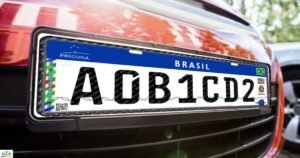When it comes to license plate numbers, many might not realize the extent of information that can be gleaned from them.
While it may seem like just a random sequence of letters and numbers, a license plate number holds significant potential for those who know how to leverage it.
In this article, we’ll explore the various ways in which someone can utilize a license plate number, from basic identification to more sophisticated uses.
Identification and Tracking
One of the most obvious uses of a license plate number is for identification and tracking purposes. Law enforcement agencies, private investigators, and even individuals may use license plate numbers to:
Identify Vehicle Owners
With access to certain databases, individuals can find out who owns a particular vehicle by searching for its license plate number.
Track Vehicle Movement
License plate numbers can be used to track the movement of vehicles, whether it’s for surveillance purposes or to monitor traffic patterns.
Retrieve Vehicle Information
By running a license plate number through a database, one can retrieve information about the vehicle, such as its make, model, year, and VIN (Vehicle Identification Number).
Legal and Regulatory Purposes

License plate numbers play a crucial role in ensuring compliance with various legal and regulatory requirements. Here’s how:
Enforcement of Traffic Laws: Law enforcement agencies use license plate numbers to enforce traffic laws, identify vehicles involved in accidents or crimes, and issue citations for violations.
They rely on license plate numbers to determine vehicle ownership and registration status, track stolen vehicles, and gather information for investigations. What Can Police See From License Plate?
Vehicle Registration and Renewal: License plate numbers are linked to vehicle registrations, making them essential for renewing registration and ensuring that vehicles are properly documented and licensed.
Privacy Concerns and Risks
| Privacy Concern | Description |
| Data Privacy | Concerns about the misuse of personal information |
| Surveillance | Raises questions about civil liberties and government overreach |
| Identity Theft | Potential for use in identity theft and fraud schemes |
| Tracking Individuals | Raises concerns about individuals’ right to privacy |
| Government Access to Data | Potential for abuse of power and infringement of rights |
Privacy concerns associated with license plate numbers highlight the need for robust regulations and safeguards to protect individuals’ personal information in an era of increasing surveillance and technological advancement.
Commercial and Investigative Uses

Beyond law enforcement and regulatory purposes, license plate numbers are also valuable in commercial and investigative contexts. Consider the following:
Insurance Investigations: Insurance companies may use license plate numbers to investigate claims, verify vehicle ownership, and detect fraud.
Repossession: Lenders and repossession agencies use license plate numbers to locate and repossess vehicles from delinquent borrowers.
Asset Recovery: Private investigators and asset recovery firms may use license plate numbers to locate and recover stolen or missing vehicles.
Technological Advances and Automation
Advances in technology have further expanded the possibilities for using license plate numbers. With the advent of automated license plate recognition (ALPR) systems, for example, it’s now possible to:
Automate Surveillance
ALPR systems use cameras and image processing algorithms to automatically read license plate numbers. Then they compare them against databases of interest, enabling real-time surveillance and monitoring.
Enhance Security
ALPR technology is used in various security applications, such as access control, border security, and parking enforcement.
FAQ’s
How can someone find out who owns a vehicle using a license plate number?
They can use online databases or contact their local Department of Motor Vehicles (DMV) for vehicle registration information.
Is it legal for individuals to run license plate numbers through databases?
It depends on the jurisdiction and the purpose for which the information is being sought. Some databases are restricted to law enforcement use only.
Can license plate numbers be used to track someone’s movements?
Yes, automated license plate recognition (ALPR) systems help track vehicle movements. Access to certain databases also aids in this tracking process.
Conclusion
A license plate number is more than just a string of characters—it’s a powerful tool with diverse applications. Various entities can use the information associated with a license plate number in multiple ways, ranging from basic identification and tracking to legal compliance and commercial purposes.
It’s essential to balance the benefits of using license plate numbers with respect for privacy and civil liberties. As with any form of personal data.
Technology continues to advance. This evolution of license plate numbers will likely bring both opportunities and challenges for society.










